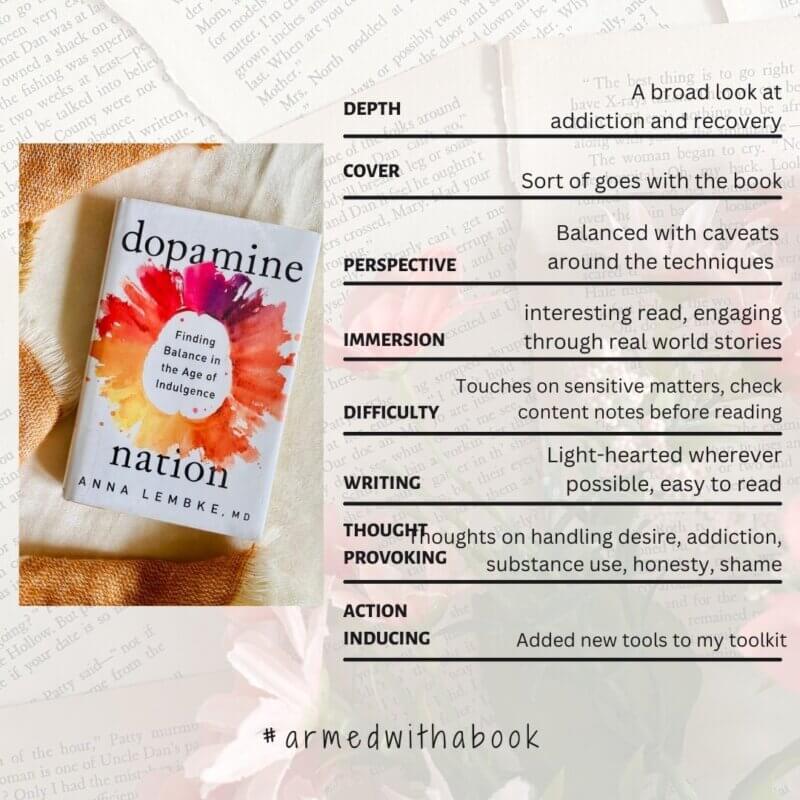Welcome friend! Dopamine Nation: Finding Balance in the Age of Indulgence by Anna Lembke is a short and insightful book about addiction and recovery. Bringing numerous thought-provoking stories from her psychiatric practice, Anna Lembke has written a book which is hard to put down. I read it in two days. Though I have read books here and there about addiction, both fiction and non-fiction, this was the first time when a number of addictions were covered as well as general insights on life and living were offered. Here is what it is about:

Anna Lembke | Goodreads
This book is about pleasure. It’s also about pain. Most important, it’s about how to find the delicate balance between the two, and why now more than ever finding balance is essential. We’re living in a time of unprecedented access to high-reward, high-dopamine stimuli: drugs, food, news, gambling, shopping, gaming, texting, sexting, Facebooking, Instagramming, YouTubing, tweeting… The increased numbers, variety, and potency is staggering. The smartphone is the modern-day hypodermic needle, delivering digital dopamine 24/7 for a wired generation. As such we’ve all become vulnerable to compulsive overconsumption.
In Dopamine Nation, Dr. Anna Lembke, psychiatrist and author, explores the exciting new scientific discoveries that explain why the relentless pursuit of pleasure leads to pain…and what to do about it. Condensing complex neuroscience into easy-to-understand metaphors, Lembke illustrates how finding contentment and connectedness means keeping dopamine in check. The lived experiences of her patients are the gripping fabric of her narrative. Their riveting stories of suffering and redemption give us all hope for managing our consumption and transforming our lives. In essence, Dopamine Nation shows that the secret to finding balance is combining the science of desire with the wisdom of recovery.
Content notes include addiction, sexual content, drug abuse, alcoholism, alcohol, medical content, animal cruelty, and body shaming.
Dopamine Nation: Finding Balance in the Age of Indulgence – Book Review
It was easy to make a connection to Anna because she is a reader. She unabashedly shared about her two-year long addition to erotica, an obsession that started with Twilight and ended with sleepless nights and her minimising attention to work and home. Her compulsive reading habits that eventually led to her not finding even one book she could enjoy made me think of ‘reading slumps’. On Instagram, I regularly see someone or another mention they are experiencing this lack of pleasure in reading. No matter what they pick up, they just cannot immerse themselves in it or enjoy it.
As I read Anna’s experience, of her own addiction and the ones that her clients were willing to share with the readers of this book, I hoped to find some ideas on how to avoid reading slumps. What can I do to pursue what I like without getting to the point of excess?
I was not disappointed.
While most of the issues that Anna talks about in this book are around addiction to substances like alcohol and prescription drugs, sex, marijuana, there are passing mentions to how social media offers similar highs as technology has become an accepted part in our lives through smart phones.
Anna shares strategies she uses in her practice to understand patients and I found DOPAMINE as an acronym to access behavior helpful:
(D)ata
(O)bjectives
(P)roblems
(A)bstenance
(M)indfulness
(I)nsight
(N)ext steps
(E)xperimentation
Anna shared self-binding strategies that have been used by recovering addicts to create distance between the desire and the consumption. These can be restrictions based on time, proximity and meaning and values.
I have been reading Radical Acceptance by Tara Brach and it was refreshing to see many of her teachings reiterated by Anna in Dopamine Nation, without any reference to Buddhism per se. Part 3 of the book was particularly engaging: Anna introduced me to the concept of Radical Honesty and why it is important, not just for anyone working through addiction but in life in general. She also talked about the relationship between lies and shame, then moved on to how shame may be used to guide better habits.
Dopamine Nation is full of experiences of real people who were addicted to someone and their behavior was causing others and themselves harm. Amongst the many personal stories in this book, I will never forget the one about the doctor who got a DUI, the teenager who had been using marijuana daily for five years and the gentleman who created a machine to help him masturbate. There was something to learn from each of them and I loved the place of compassion Anna came from and how these individuals ultimately worked to create a better relationship with themselves and their desires.
Anna refers to the twelve steps of AA, medical and psychological peer-reviewed research and statistics available through health agencies around the world to create a holistic view of addiction and recovery. She comments on the rise of pharmaceutical drugs in treatment practices and the effects that pain can have to help balance with pleasure. I expected there to be more around tackling overconsumption due to technology but maybe the idea is that the strategies are the same, whether the addition is delivered digitally or in a physical form.
There are certain facts quoted in this book that can be seen to mean anti-marijuana or anti-whatever readers’ prior experience has been. Nothing jumped out to me that way and I can’t speak to what may have been missed by the author. If you are interested in this book and want to dig a little deeper into what it covers, be sure to read more reviews on Goodreads.

Would you pick up Dopamine Nation: Finding Balance in the Age of Indulgence? Add it on Goodreads.

Be First to Comment